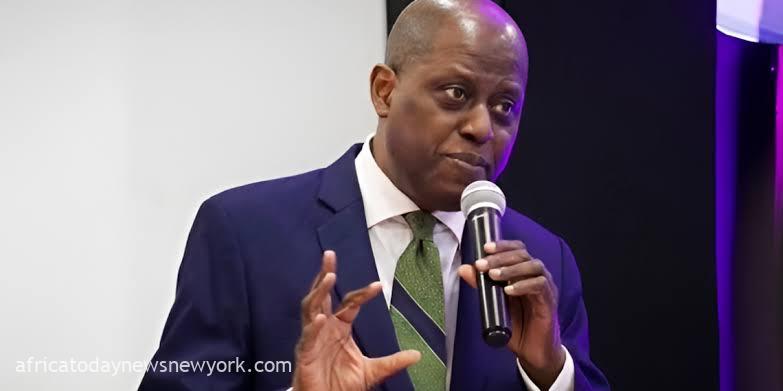Nigeria’s Central Bank Governor, Olayemi Cardoso, announced a halt to “Ways and Means” advances to the government, demanding repayment of outstanding loans before resuming financing.
This move, aimed at curbing inflation and promoting fiscal responsibility, has sparked debate about its potential impact on the nation’s economy.
The Governor doubled down, emphasizing that the “Ways and Means” freeze was just one of several tools the Central Bank was wielding to combat the nation’s economic woes. This multi-pronged approach, he believes, will be crucial in pulling the country out of its current slump.
Ways and Means acts like a financial Band-Aid, plugging budget holes until tax dollars or other income streams reach the government’s coffers. This temporary funding allows the government to keep basic services running and essential projects moving forward.
During the tenure of the former administration, the ex-Central Bank governor, Godwin Emefiele, purportedly printed N22.7tn for former President Muhammadu Buhari under Ways and Means, without the required approval from the National Assembly.
Governor Cardoso faced a Senate grilling on Friday, joined by leading economic figures. Finance, appropriations, and financial experts tackled the nitty-gritty of the nation’s economic plan, raising questions and seeking clarity on key strategies.
The Senate had summoned the economic team including the CBN governor, Minister of Finance, Wale Edun; the Minister of budget and Economic Planning, Atiku Bagudu; the minister of Agriculture, Abubakar Kyari, to address the current economic situation and more importantly, the free fall of the naira and hike in prices of foodstuffs.
The CBN governor said, ‘On our side at the CBN, we have responded with significant monetary policy tightening to rein in inflationary pressure.’
‘Empirical analysis has established that money supply is one of the factors fueling the current inflationary pressure. For instance, an analysis of the trend of the money supply spanning over nine months shows that M3 increased from N52.01tn in January 2023 to N68.25tn in November 2023 representing N16.24tn or 31.22 per cent increase over the period.’
‘Increase in Net Foreign Asset following the harmonization of exchange rates and the N3.22tn ways and means advances were the major factors driving the increase in money supply.’
He further explained, ‘I am pleased to note the Fiscal Authorities efforts in discontinuing Ways and Means advances. This is also in compliance with section (38) of the CBN Act (2007), the Bank is no longer at liberty to grant further ways and means advances to the Federal Government until the outstanding balance as of December 31, 2023, is fully settled.’
‘The Bank must strictly adhere to the law limiting advances under ways and means to five percent of the previous year’s revenue.’
‘We have also halted quasi-fiscal measures of over N10tn by the Central Bank of Nigeria under the guise of development finance interventions which hitherto contributed to flooding excess naira and raising prices to the levels of inflation we are grappling with today.’
Read also: CBN Lifts Forex Ban On 43 Items – Cardoso
The CBN governor further stated that its efforts were beginning to yield results to ease the economic situation in the country.
Cardoso while addressing the issues said, ‘These measures, aimed at ensuring a more market-oriented mechanism for exchange rate determination, will boost foreign exchange inflows, stabilize the exchange rate, and minimize its pass-through to domestic inflation.’
‘Indeed, they have already started yielding early results with significant interest from Foreign Portfolio Investors that have already begun to supply the much-needed foreign exchange to the economy.’
‘For example, upwards of $1bn in the last few days came in to subscribe to the Nigeria Treasury Bill auction of N1tn which saw an oversubscription earlier this week.’
Cardoso added, ‘Our measures aimed at improving USD supply into the Nigerian economy, has significant potential in taming the volatility of the exchange rates. However, for these measures to be sustainable, we must as a country, moderate our demand for FX.’
In a drive for economic independence, the CBN Governor urged Nigerians to embrace local products and services. He stressed the importance of “reducing” reliance on foreign goods and dollars, fostering a stronger national economy and a more resilient Naira.
Emphasizing the need for realistic expectations, the Governor cautioned against false hopes. He explained that without moderation in the demand for USD, even the most powerful economic tools would be insufficient, highlighting the importance of transparency and honesty about the challenges faced.
The Governor reported encouraging developments on the economic front. He pointed to a $1 billion rise in foreign currency inflows, suggesting their interventions are starting to stabilize the situation and expressing confidence in their continued efforts.
He said, ‘The Nigerian foreign exchange market is currently facing increased demand pressures, causing a continuous decline in the value of the naira. Factors contributing to this situation include speculative forex demand, inadequate forex supply increased capital outflows, and excess liquidity.’
